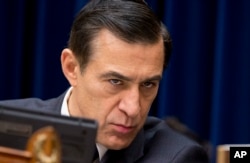U.S. lawmakers warned Tuesday that an extension of a COVID-era patent waiver could jeopardize U.S. innovation and favor China in the global race for strategic competition.
The World Trade Organization waived global patent protections established under the 1995 TRIPS Act for the COVID-19 vaccine last June and is currently considering an expansion of that waiver that would include diagnostic and preventative tools. The Biden administration asked the U.S. International Trade Commission, or USITC, to investigate what impact the expansion could have on U.S. pharmaceutical innovation.
Representative Darrell Issa, the chairman of the House Judiciary Subcommittee on Courts, Intellectual Property and the Internet, introduced the measure known as the No Free TRIPS Act Tuesday. Companion legislation has been introduced in the U.S. Senate by Republican lawmaker Marsha Blackburn.
Issa said, “Any expansion of the TRIPS waiver agreement will undermine the very innovation and record-breaking, rapid development that we saw for COVID-19. And for that reason, we are here today to talk not just about the risk of helping China, but the very risk to the innovation that we all enjoy here in the United States.”
If passed, the No Free TRIPS Act would prevent the Biden administration from engaging in or concluding negotiations on the WTO agreement without congressional authorization. Since 1995, TRIPS has required members of the WTO to obey minimum rules for the protection of intellectual property.
The concern is on both sides of the aisle in the U.S. Congress, according to Representative Hank Johnson, the leading Democrat on the House Judiciary subcommittee on Courts, Intellectual Property and the Internet.
While maintaining that the waiver was necessary to prevent the global spread of COVID-19, he said Tuesday, “I do not dismiss the concerns of those who oppose the TRIP waiver, particularly those who fear that the Chinese government will take advantage of the waiver to access American technology and to use this technology to compete with American companies.”
Johnson added: “We know that the Chinese government has a history of using theft and strong-arm tactics to acquire foreign intellectual property, which hurts our inventors’ ability to compete and succeed.”
When the Biden administration initially backed the waiver, then-Speaker of the House Nancy Pelosi applauded the decision, saying in a statement, “Accelerating the production and distribution of life-saving vaccines across the globe is both a moral imperative and an urgent necessity to crush the virus pandemic and prevent the spread of more virulent coronavirus variants. We cannot be fully safe from the virus anywhere until we defeat it everywhere.”
But Marc L. Busch, a professor of international business diplomacy at Georgetown University, told lawmakers Tuesday, “The TRIPS waiver was a mistake. Expanding it will make things worse. It won’t help fight COVID but it will hurt U.S. innovation, and it will contribute to other countries realizing their industrial policy goals. Moreover, it will potentially lead to the U.S. facing greater efforts, not least on the part of China and at economic coercion.”
Legislation introduced previously in Congress to limit the administration’s authority to negotiate waivers has failed to advance.



